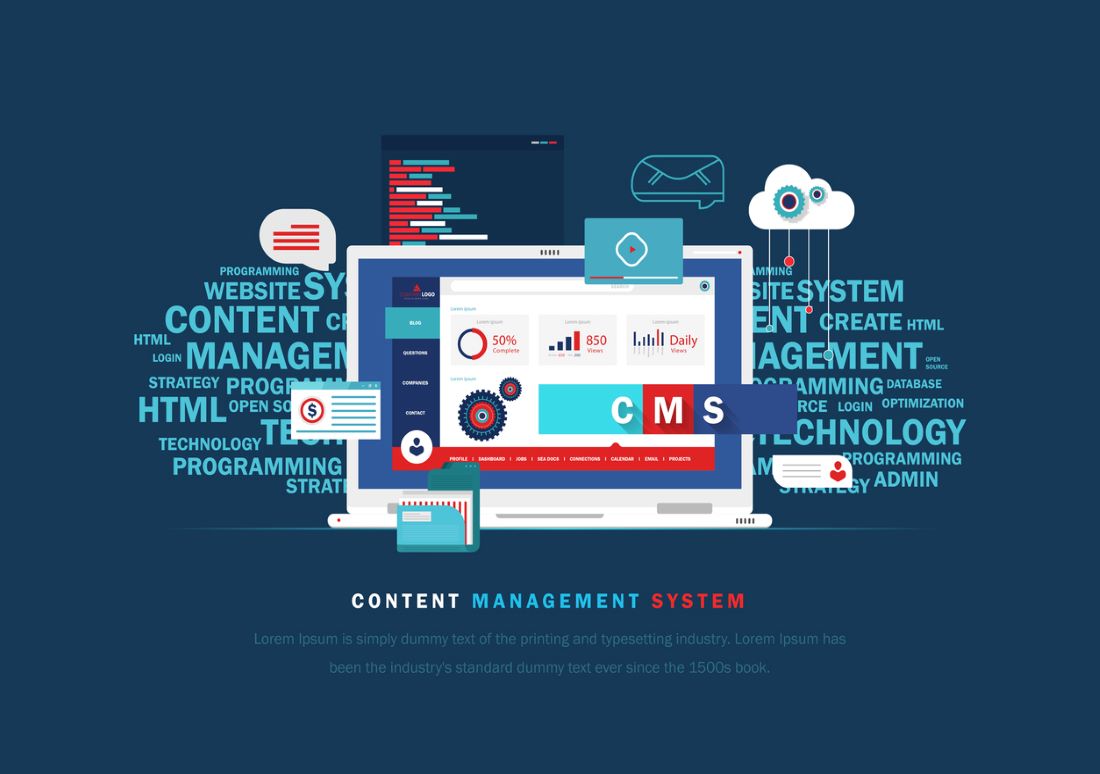
December 15, 2022
When it comes to building a website, choosing the right content management system (CMS) platform is an important decision. A CMS platform provides the tools and features that you need to create and manage your website content, and can have a big impact on the success of your website.
In this blog post, we will discuss some of the key factors to consider when choosing a CMS platform and provide some recommendations for the best options available.
Whether you are a small business owner, a blogger, or an enterprise organization, there is a CMS platform that is right for you and your website. Keep reading to learn more.
Here is a list of 10 options to consider for your business
1. WordPress
 This is the most popular CMS platform, with a user-friendly interface and a wide range of features and capabilities. It is used by millions of websites around the world. It is prominent because of its user-friendly interface, wide range of features and capabilities, and the fact that it is open-source and free to use.
This is the most popular CMS platform, with a user-friendly interface and a wide range of features and capabilities. It is used by millions of websites around the world. It is prominent because of its user-friendly interface, wide range of features and capabilities, and the fact that it is open-source and free to use. Some of the key features of WordPress include its customizable design, support for multiple users and roles, built-in blogging tools, and the ability to add plugins and themes to extend its functionality.
Additionally, WordPress has a large community of users and developers who contribute to its development and offer support and resources.
Overall, WordPress is a versatile and powerful CMS platform that is well-suited for a wide range of websites, from small personal blogs to large e-commerce stores.
2. Shopify
 This is a popular e-commerce platform that allows users to create an online store and manage their products and inventory. It is popular because of its user-friendly interface and the wide range of features and tools that it offers.
This is a popular e-commerce platform that allows users to create an online store and manage their products and inventory. It is popular because of its user-friendly interface and the wide range of features and tools that it offers. Some of the key features of Shopify include its support for multiple payment gateways, built-in support for SEO and social media, and the ability to add features and functionality using a variety of apps and integrations.
Additionally, Shopify has a large community of users and offers support and resources to help people build and manage their online stores.
Overall, Shopify is a powerful and user-friendly e-commerce platform that is well-suited for businesses and individuals who want to sell products online.
3. Magento
 This is a powerful e-commerce platform that is used by large businesses and offers a wide range of features and capabilities. It is popular because of its flexibility and the ability to customize it to meet specific business needs.
This is a powerful e-commerce platform that is used by large businesses and offers a wide range of features and capabilities. It is popular because of its flexibility and the ability to customize it to meet specific business needs.Some of the key features of Magento include its support for multiple websites and stores, built-in support for SEO and marketing, and the ability to add extensions to extend its functionality.
Additionally, Magento has a large community of users and developers who contribute to its development and offer support and resources. Overall, Magento is a powerful and scalable e-commerce platform that is well-suited for large businesses and organizations that need a customizable solution for their online store.
4. Joomla
 This CMS platform is popular among businesses because of its flexibility and the ability to customize it to your specific needs. Some of the key features of Joomla include its support for multiple users and roles, built-in support for multiple languages, and the ability to add extensions to extend its functionality.
This CMS platform is popular among businesses because of its flexibility and the ability to customize it to your specific needs. Some of the key features of Joomla include its support for multiple users and roles, built-in support for multiple languages, and the ability to add extensions to extend its functionality. Additionally, Joomla has a large community of users and developers who contribute to its development and offer support and resources.
Overall, Joomla is a powerful and scalable CMS platform that is well-suited for businesses that need a customizable and flexible solution for their website.
5. Drupal
 This is a powerful and scalable CMS platform that is often used by large organizations and enterprises. It is popular because of its powerful and scalable architecture, as well as its flexibility and the ability to customize it to meet specific business needs.
This is a powerful and scalable CMS platform that is often used by large organizations and enterprises. It is popular because of its powerful and scalable architecture, as well as its flexibility and the ability to customize it to meet specific business needs. Some of the key features of Drupal include its support for multiple users and roles, built-in support for multiple languages, and the ability to add modules to extend its functionality.
Additionally, Drupal has a large community of users and developers who contribute to its development and offer support and resources. Overall, Drupal is a powerful and flexible CMS platform that is well-suited for large businesses and organizations that need a scalable and customizable solution for their website.
6. Wix
 This is a cloud-based website builder that allows users to create professional-looking websites without any coding skills. It is well-liked because of its user-friendly interface and the wide range of design tools and templates that it offers.
This is a cloud-based website builder that allows users to create professional-looking websites without any coding skills. It is well-liked because of its user-friendly interface and the wide range of design tools and templates that it offers.Some of the key features of Wix include its drag-and-drop website editor, support for e-commerce, and the ability to add features and functionality using a variety of apps and integrations.
Additionally, Wix has a large community of users and offers support and resources to help people build and manage their websites. Overall, Wix is a versatile and user-friendly website builder that is well-suited for small businesses and individuals who want to create a professional-looking website quickly and easily.
7. Squarespace
 This is another popular website builder that offers a variety of templates and design tools to help you create a beautiful website without any coding skills. It is well-recieved because of its elegant design templates and the wide range of features and tools that it offers.
This is another popular website builder that offers a variety of templates and design tools to help you create a beautiful website without any coding skills. It is well-recieved because of its elegant design templates and the wide range of features and tools that it offers.Some of the key features of Squarespace include its drag-and-drop website editor, support for e-commerce, and the ability to customize the design and layout of your website.
Additionally, Squarespace has a large community of users and offers support and resources to help people build and manage their websites. Overall, Squarespace is a user-friendly and powerful website builder that is well-suited for businesses and individuals who want to create a beautiful and functional website.
8. Weebly
 This is a user-friendly website builder that is popular among small businesses and startups. It is easy to use and offers a variety of templates and design tools to help users create professional-looking websites.
This is a user-friendly website builder that is popular among small businesses and startups. It is easy to use and offers a variety of templates and design tools to help users create professional-looking websites. Some of the key features of Weebly include its drag-and-drop website editor, support for e-commerce, and the ability to add features and functionality using a variety of apps and integrations.
Additionally, Weebly has a large community of users and offers support and resources to help people build and manage their websites. Overall, Weebly is a versatile and user-friendly website builder that is well-suited for businesses and individuals who want to create a professional-looking website quickly and easily.
9. Ghost
 This is a CMS platform that is focused on creating great content and offers a clean and simple user interface. It has a clean and simple user interface and is popular among bloggers and other content creators.
This is a CMS platform that is focused on creating great content and offers a clean and simple user interface. It has a clean and simple user interface and is popular among bloggers and other content creators.Some of the key features of Ghost include its support for multiple users and roles, built-in support for SEO and social media, and the ability to add custom themes and plugins to extend its functionality.
Additionally, Ghost has a large community of users and developers who contribute to its development and offer support and resources.
Overall, Ghost is a powerful and user-friendly CMS platform that is well-suited for businesses and individuals who want to create and manage engaging content for their websites.
10. HubSpot
 This is a comprehensive marketing and sales platform that includes a CMS for creating and managing your website content. It is excellent because of its wide range of features and tools that help businesses attract, engage, and convert their website visitors.
This is a comprehensive marketing and sales platform that includes a CMS for creating and managing your website content. It is excellent because of its wide range of features and tools that help businesses attract, engage, and convert their website visitors.Some of the key features of HubSpot include its support for multiple users and roles, built-in support for SEO and social media, and the ability to add custom modules and integrations to extend its functionality.
Additionally, HubSpot has a large community of users and offers support and resources to help businesses build and manage their websites. Overall, HubSpot is a powerful and user-friendly platform that is well-suited for businesses and organizations that want to create and manage a successful website and generate leads and sales.
Ultimately, the best CMS platform for your business will depend on your specific needs and goals. It’s important to do your research and choose a platform that offers the features and capabilities that you need to build a successful website for your business.




No Comments